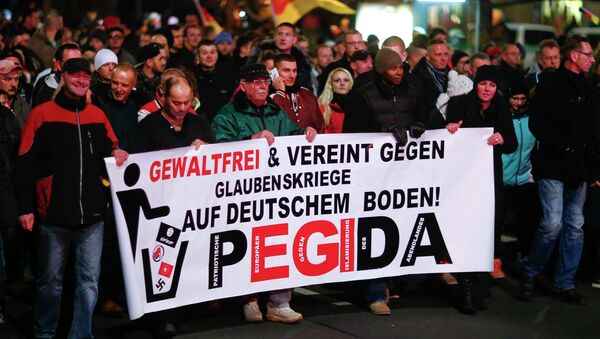MOSCOW, January 30 (Sputnik) — It is too early to speak of the end of German anti-Islam movement Pegida after five of its founding members resigned earlier this week, a spokesman for the German anti-discrimination organization Miteinander told Sputnik on Friday.
“I think it is premature to speak about the end of Pegida in the light of its obvious split. At the moment, Pegida enjoys a lot of German media attention, including that of controversial nature,” David Begrich said.
“Pegida’s future agenda will determine whether the mobilization will continue at the previous rate,” he added.
Patriotic Europeans Against the Islamization of the West, known by its acronym Pegida, was founded in October 2014 and has organized major rallies in Germany.
According to Bergich, the group was neither Nazi nor right-extremist, however, the values promoted by Pegida have been “racist and xenophobic”.
The group’s now resigned leadership’s unwillingness to be associated with neo-Nazis “does not change the fact that there are many neo-Nazis among Pegida protesters,” Begrich added.
The spokesman noted that apart from criticism of Islam, issues such as post-democracy and representation deficit have caused people to join Pegida’s rallies. “Even if the number of Pegida participants drops, these issues will stay or reappear in the future,” he said.
Addressing the recent upsurge in nationalist sentiment across Europe, Begrich explained that the nature of such movements varies greatly from country to country, depending on the local political situation.
In Western Europe, a variety of right-wing populist movements have emerged, some of which are represented in the EU parliament. “The reason for this lies in the crisis of legitimacy of West European representative democracy,” Begrich told Sputnik.
In the East, nationalist movements are of a “military and ethnic character” that restricts and encroaches on freedoms of minorities, he added.



